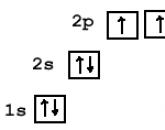View a presentation on preparing children for school. Preparing a child for school
1 slide
Parent meeting"Preparing children for school" Compiled by: teacher-speech therapist Belyaeva E.S. Balakhna 2015

2 slide
“On how childhood passed, who led the child by the hand in childhood, what entered his mind and heart from the world around him, it decisively depends on what kind of person today's baby will become.” (V. A. Sukhomlinsky)

3 slide
What is important in preparing for school? Specialists identify 4 criteria for school readiness: Physical Moral Psychological Cognitive

4 slide
Physical readiness: A prerequisite for the admission to school of children of the seventh year of life is that they reach the age of at least six and a half years by September 1. Education of children under six and a half years of age by the beginning of the school year is carried out in conditions kindergarten.

5 slide
Moral readiness: The ability to build relationships with an adult. Ability to communicate with peers. Politeness, restraint, obedience (the ability to follow the rules). Attitude towards oneself (lack of low self-esteem). You cannot compare your child's achievements with the achievements of other children. You can not force the child to work for the "assessment". It is necessary to praise your children more often, even for the slightest successes.

6 slide
Psychological readiness: This is a strong desire to learn, gain knowledge; understanding the importance and necessity of teaching; manifestation of expressed interest in obtaining new knowledge; This is the ability to listen to the teacher and complete his tasks (by no means always interesting); The ability to communicate with peers and adults (the child easily comes into contact, is not aggressive, knows how to find a way out of problem situations of communication, recognizes the authority of adults); This is a certain level of development of thinking, memory, attention.

7 slide
Mental readiness: Most important indicators is the development of thinking and speech. It is very useful to teach a child to build simple reasoning, to draw conclusions from what he has read, seen, heard, using the words: “because”; "if, then"; "That's why". Teach kids how to ask questions. It is very useful. Thinking always starts with a question. Speech is the basis on which the educational process is built. Proficiency in monologue speech is especially important. For a child, this is a retelling. After reading, ask the child a few questions about the content, ask them to retell.

8 slide
According to the program preparatory group Kindergarten child when enrolling in the first grade must: Know his name, surname, address, names of family members. Know the seasons, the names of the months, days of the week, be able to distinguish colors. Be able to count groups of objects within 10. Be able to increase and decrease a group of objects by a given amount, be able to equalize a lot of objects. Be able to compare groups of objects (greater than, less than, equal to). Be able to combine objects into groups: furniture, vehicles, clothes, shoes, plants, animals, etc. Be able to find “extra” in a group of objects (for example, remove a flower from the “clothes” group). Have elementary ideas about the world around them: about professions, about living and inanimate nature, about the rules of conduct in in public places. Have spatial representations: right-left; top bottom; straight, round, under-above; because of; from under something; navigate on a sheet of paper. Be able to communicate well with other children. Listen to adults and be able to follow their orders. Know how to take care of yourself, take care of your belongings and others. Speech must comply with language norms in all respects.

9 slide
Tips for parents: Develop perseverance, diligence of the child, the ability to bring things to the end. Form his mental abilities, observation, inquisitiveness, interest in knowing the environment. Make riddles for your child, make them together with him, conduct elementary experiments. Let the child talk aloud. The development of fine motor skills is the main indicator of readiness to master writing, reading, correct speech and intelligence in general: hands, head and tongue are connected by one thread, and any violations in this chain lead to a lag. Therefore, a normally developing child of six years old should be able and fond of drawing, sculpting, carving with scissors, using a needle, various natural materials, etc. If possible, do not give the child ready-made answers, make him think, explore and express his thoughts clearly and accurately. Put the child in front of problem situations, for example, invite him to find out why yesterday it was possible to sculpt a snowman out of snow, but not today. Talk about the books you read, try to find out how the child understood their content, whether he was able to understand the causal connection of events, whether he correctly assessed the actions of the characters, whether he is able to prove why he condemns some heroes and approves others. Watch for the correctness, distinctness of the pronunciation of sounds.
An indicator of intellectual maturity can be considered the level of general awareness of the child, his outlook and erudition. Awareness is an indicator that the child is inquisitive, wants to know “what?”, “Why?” and why?". Therefore, talk with your child on various topics as much as possible, answer in detail all his questions. By doing this, you will support the child's curiosity, the desire to learn something new and prepare him for the perception of educational material.
The development of motor skills is no less important than the development of the intellectual functions of the child. The development of fine movements of the hand is directly related to the development of the cerebral hemispheres, which means that the more accurate and subtle the movements of the hand, the better the brain develops. Activities such as modeling, assembling construction sets with small details, appliqué, drawing, knitting, assembling mosaics will help develop fine motor skills, finger games. It is useful to offer the child tasks for drawing, when an adult draws half of the drawing, and the child completes the mirror image, tasks for tracing an image marked with dots or dash-dot lines, hatching. It is important not to overdo it, and turn teaching your child the exact movements of a pencil on paper into an exciting activity.

Give your last name, first name, patronymic. Name the surname, name, patronymic of father, mother. Are you a girl or a boy? What will you be when you grow up - an aunt or an uncle? How old are you? How much will it be in a year? In two years? Is it morning or evening (afternoon or morning)? When do you have breakfast - in the evening or in the morning? When do you have lunch - in the morning or in the afternoon? What comes first, lunch or dinner? Where do you live? State your home address. What is your father's job, your mother's? What season is it now - winter, spring, summer or autumn? Why do you think so? When can you go sledding - in winter or summer? Why does it snow in winter and not in summer? Why does school need a desk, a bell? Show your right eye, left ear. What are eyes and ears for? What animals do you know? What birds do you know? Who is bigger - a cow or a goat? Bird or bee? Who has more paws: a rooster or a dog? Which is more: 8 or 5; 7 or 3? Count from three to six, nine to two. What should you do if you accidentally break someone else's item?

What is redundant here? Why? - cockroach, fly, ant, wasp, beetle, mosquito, plane; - plate, alarm clock, glass, milk jug, mug; - fox, hare, bear, bee; - machine, pyramid, spinning top, plum, bear. Name a generalizing word: - perch, crucian carp - ... - grass, tree - ... - mole, mouse - ... - bee, beetle - ... - cup, plate - ... - shoes, shoes - ...












The emotional maturity of the child assumes that such a quality as arbitrariness is already being formed in him and the ability arises to perform for quite a long time not very interesting task. By the beginning of systematic learning, children should already be able to consciously subordinate their actions to the rules, focus on school requirements (to do not only what they want, but also what the teacher requires, that is, “must” can outweigh “I want”). The maturity of the emotional-volitional sphere also implies the ability of the child to cope with their negative emotions. Observe your son/daughter's activities, such as joint game with adults. Does the child show anxiety or irritability? How does he react to criticism of his actions? Does he continue the game if something goes wrong? Does he show excessive emotion when he loses?

The ability to obey, the ability to follow certain rules, is most easily developed during the game. You will be helped by ordinary games such as “Daughters - mothers”, “Edible - not edible”, “The sea is worried”, “Yes and no, do not say, do not wear black and white”, as well as Board games with the rules. After all, in these and similar games there is a need to act as it should, as determined by the rules of the game. All kinds of magazines and books will help you develop voluntary attention, in which there are many tasks like: “find the differences between the pictures”, “tangled paths”, “what is superfluous here”, “what the artist confused”, “find the missing details”, etc. They are funny, interesting for children and very useful for the development of arbitrariness. The main thing is that the tasks correspond to the capabilities of your child. Too simple tasks cause boredom and do not teach to overcome difficulties, and too difficult tasks can lead to the fact that the child refuses to study.







No less important than the above is the social readiness of the child for school. This is an ambiguous concept, including: the ability and desire to communicate with peers (the child’s desire to communicate with other children), the ability to subordinate their behavior to the laws of the children’s group, does the child have experience in an acceptable (without violence) conflict resolution, the ability to build adequate relationships with adults .
 The child must be willing to go to school. This assumes that your son or daughter wants to go to school, not because an older brother or sister is studying there, and not because you want to show everyone your new bag and school supplies, although there is nothing wrong with these motives. However, you can be sure that your child has reached personal, motivational maturity only when behind his desire to go to school is, firstly, the desire to acquire new knowledge (interest), to realize intellectual activity, and secondly, the need for new social status- the desire not just to learn while playing, but to participate in serious activities, the results of which will be positively assessed by significant adults and other children. It has long been known that it is impossible to force a child to learn if he himself does not want to, because it is always more pleasant to do something according to own will. Motivational readiness for school begins with good relationship child to himself and faith in the possibility of being better. A great influence on motivation is also what and how parents say about the school, what they encourage in the behavior of the child.
The child must be willing to go to school. This assumes that your son or daughter wants to go to school, not because an older brother or sister is studying there, and not because you want to show everyone your new bag and school supplies, although there is nothing wrong with these motives. However, you can be sure that your child has reached personal, motivational maturity only when behind his desire to go to school is, firstly, the desire to acquire new knowledge (interest), to realize intellectual activity, and secondly, the need for new social status- the desire not just to learn while playing, but to participate in serious activities, the results of which will be positively assessed by significant adults and other children. It has long been known that it is impossible to force a child to learn if he himself does not want to, because it is always more pleasant to do something according to own will. Motivational readiness for school begins with good relationship child to himself and faith in the possibility of being better. A great influence on motivation is also what and how parents say about the school, what they encourage in the behavior of the child.


United school uniform Availability of a second shoe Uniform for physical education lessons Necessary school supplies Five-day school week Minimum in terms of volume homework Unmarked learning Schedule of bells and lessons Seating children at desks according to medical indications Scheme of a safe way to school After-school group Additional education

When I have my first meeting with the parents of children who have just signed up for our association, I show this presentation. It is small, but I explain everything in detail to dads, moms and grandmothers of newly made students. This presentation helps parents properly prepare their child for school.
View document content
"Preparing a child for school" presentation
Is your child going to first grade?
Prepared by the teacher additional education MKU DO "TsVR" Sosina T. S.

Preparing a child for school
A child's readiness for school is the most important topic during preschool childhood.

Prepared by:
Sosina Tatyana Serafimovna
Teacher of additional education

- Let's define...
- Let's think...
- Let's discuss...

Successful student...
Able to digest educational program offered by the school;
Receiving high school marks;
Able to apply the acquired knowledge in life;
Positive attitude towards school;
With positive self-esteem;
Having good mental and physical health;
Having a good relationship with the teacher and
classmates;

Student success is not only
high score, not only
positive evaluation of the teacher, but also positive
self-esteem and self-perception of the child.

Physical readiness
Psychological readiness
Intellectual readiness
Communicative readiness
The required level of development of speech and fine motor skills

Physical readiness is determined by: :
- Physical development, which corresponds to the age of the child.
Physical development includes:
- Anthropometric and biometric indicators (height, weight, chest circumference, posture, etc.).
- Physical qualities (endurance, agility, speed, strength, flexibility, balance).

Psychological readiness:
- psychological traits inherent in the student;
- desire to become a schoolboy;
- do serious work - study.

Intellectual readiness:
- development of attention, memory;
- formed mental operations of analysis, synthesis, generalization, establishment of patterns, spatial thinking;
- the ability to establish connections between phenomena and events;
- make simple inferences based on analogy.

Reflection
X is good
And - interesting
M - interfered
S - I'll take it with me
Popular
- Celebration of the day of agriculture and processing industry
- When is Agriculture Day celebrated?
- Card games at the table
- Funny and funny contests for a fun company of adults
- Polish "paratroopers" for the Soviet marines
- Project 205 missile boats
- How is life on the new Chinese destroyer
- The newest frigate "Admiral of the Fleet Kasatonov" is preparing for the first tests and going to sea Ship Admiral Kasatonov
- Submarines of the Gato type
- Insignia on the merchant fleet of the USSR Detachment of the II group




